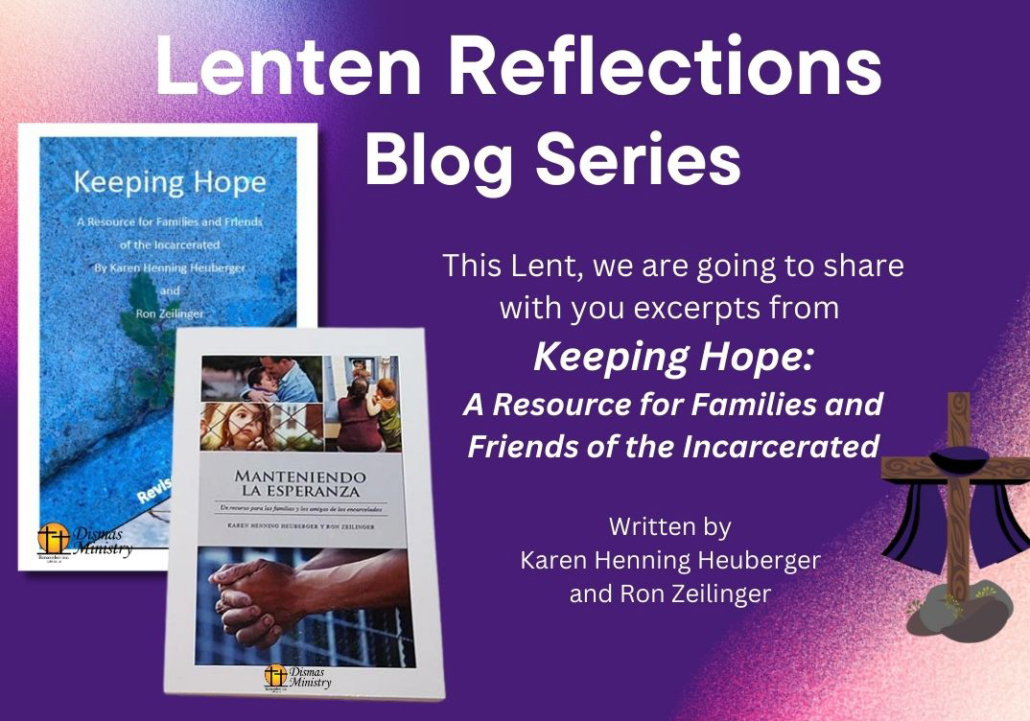This Lent, we are going to share with you excerpts from Keeping Hope: A Resource for Families and Friends of the Incarcerated
Written by Karen Henning Heuberger and Ron Zeilinger
“Special Circumstances”
Mental Illness – If your loved one has a mental illness, you may face the challenge of trying to make sure he or she is getting needed treatment. Unfortunately, other than changing laws at the national level, you cannot force your loved one to take any necessary medications. And if you are not the inmate’s legal guardian or hold power of attorney, the correctional system does not inform you of your loved one’s medical status unless the appropriate forms have been signed beforehand. Often this can take weeks.

This means that if your loved one doesn’t want you to know whether he or she is taking medication or not, you will not be informed. (If you do become your loved one’s legal guardian, you will be responsible for any issues that arise after release.) Also, oftentimes the prisoner will be given enough medication to make the person cooperative in prison, but not necessarily enough to make him or her function at a “normal” level. This can be very frustrating for you. If your loved one is not on the correct medication, or at the appropriate dosage, it may make it even harder to connect with him or her.
When visiting or talking on the phone, you may not know what to say that won’t agitate him or her. For example, conversations may trigger your loved one’s delusions. Or the inmate may cancel visits or not respond to contacts. The inmate may want to put everything behind them including you.
Juvenile Offenders – If your incarcerated loved one is a juvenile, you may feel even more of an emotional strain. If you are the parent of the offender, you may feel responsible your child’s actions. Parents usually worry about their children going down the wrong path. Juvenile offenders may have come from foster homes, abusive situations, or other institutions, so their connection with people who care about them may be more strained. They may feel more connected to their peers or a gang, who may be part of the reason for the incarceration. This may make it difficult to maintain a close relationship for you and others who want to stay connected and support them.
Immigrant Detainees – If your loved one is detained because of an immigration status only, there are often the challenges of an indeterminate length of incarceration and the threat of deportation. Immigrant detainees are not legally entitled to counsel and may have to prepare their cases for themselves while incarcerated. They are often moved around to facilities hundreds of miles away and transfers may occur often without notice.
According to Human Rights Watch (hrw.org), “52 percent of detainees experienced at least one such transfer in 2009” and “over 46 percent of transferred detainees were moved at least two times, with 3,400 people transferred 10 times or more.” This situation may make it especially difficult for you to visit or even to stay in touch.
If you are able to visit the detention facility, remember that you need a current, valid ID to get in. If you are undocumented as well, it may not be safe for you to stay in contact. You may then not know where your loved one is or how the case is proceeding. You may not know how to help your loved one’s case. This can be heartbreaking. Even when legal counsel is not available, in most communities there are agencies and churches that may be able to assist you in at least locating your loved one without placing yourself in danger.
If the immigrant detainee has children, a custody case may also be in play and preparation for that is done while incarcerated as well. If you can, alert the person to find the law library, and enlist the help of a librarian, a chaplain, or even other prisoners. It is important that your loved one has a plan in place for the care of his or her children, especially with the threat of deportation. Otherwise the children will likely enter the foster care system and may be separated from the family indefinitely – if not permanently.
Parole – If the prisoner has been released on parole, you may find as many or more challenges in your life. You may worry about your loved one violating parole, whether intentionally or not. You may see the parolee struggling to stay out of trouble, get a job or keep a job. Employers often simply don’t want to take the risk of hiring your loved one who has a record. Or you may see your spouse or friend going back to the same group of friends and the same habits that got him or her into trouble originally. You may not be able to do anything about this and just have to watch it happen. If the parolee doesn’t live with you, you may be able to do nothing but hope that the conditions of parole are being kept and the loved one is working to stay straight. Try to avoid gossip, rumors and false accusations from others. There may be many sides to every story.
You may see your paroled spouse or friend taking advantage of family or friends. In some areas of the country, there are “Re-entry” programs designed to support ex-offenders, such as The Fortune Society and Exodus Transitional Community in New York City. If you have access to the Internet, you can do a Google search for “Re-entry programs” in your city, to find what you need nearby. In addition, there are support programs for the families of ex-offenders.
Even if an ex-offender is trying to make changes, “being on the outside” after incarceration can be such a challenge, your loved one may not make it and may return to prison. This may be devastating for you, your family and friends.
No matter what your loved one’s situation is, adjusting to these new challenges in your life will take time, and finding the support you need is absolutely essential. There are many methods and ways to help you cope. You must resolve to find them if you seek reconciliation with your loved one.

READ MORE FROM KEEPING HOPE BY PURCHASING YOUR COPY ON OUR STORE PAGE.


